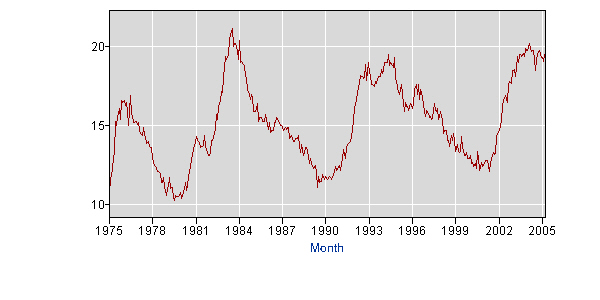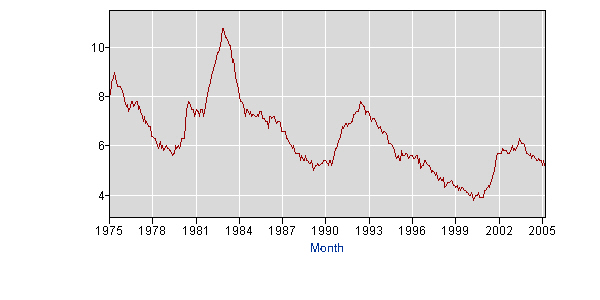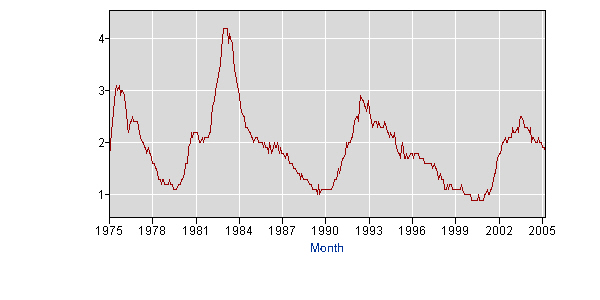Over the past 25 years the lives of working Americans have become ever less secure. Jobs come without health insurance; 401(k)'s vanish; corporations default on their pension obligations; workers lose their jobs more often, and unemployment lasts much longer than it used to.
Now, I was a bit young at the time, but I don't remember "25 years" ago as a time of comparative prosperity and security. Rather it was a time of economic chaos, high unemployment, inflation and uncertainty.
Unemployment by year
1975 8.48%
1976 7.7%
1977 7.05%
1978 6.07%
1979 5.85%
1980 7.18%
1981 7.62%
1982 9.71%
1983 9.6%
Inflation by year
1975 7.13%
1976 5.04%
1977 6.68%
1978 8.99%
1979 13.26%
1980 12.35%
1981 8.91%
1982 3.87%
1983 3.79%
It would take more research, but I am sure if you looked you would find his statments of "workers losing their jobs more often" and "staying on unemployment longer" false too. Maybe Paul was off by a few years and meant over the last "20 years", intending to compare the current situation with the Reagan boom...
UPDATE: I decided to use my future MBA skills and take a look at the statistics, starting with the claim that "unemployment lasts much longer than it used to".
To give Krugman some credit, the graph does show a slight upwards trend, depending how you measure it, although I do not know how you could call this lasting "much longer"
Average Weeks Unemployed


This is misleading though, because the unemployment rate over that same period has trended downward, as I mentioned before.
Unemployment Rate

However, since Krugman's whole point is that people are less secure in their jobs, it is misleading to look solely at the length of unemployment among those who are unemployed. Is it logical to say that workers feel less secure over a small increase in the average duration of unemployment, set against a large drop in the rate of unemployment? The workplace has grown much more complex and technical over the last few decades, this factor alone could account for a slight rise in the time needed to get a new job, not a bad economy. Besides, if there is a low unemployment rate, the chronically unemployed underclass, those who will be unemployed no matter how the economy is, will be a larger proportion of the rate and inflate it. So what happens if we look at the percentage of long term unemployed, in this case those unemployed 15 weeks or longer, as a percentage of the work force as a whole?
Percent Of Civilian Labor Force Unemployed 15 Weeks & over

Far from trending upward, it is actually decreasing, from cyclical peaks of 3.1% and 4.2% in 1975 and 1982, to only 2.9% and 2.5% in 1993 and 2003, respectively. This once again shows how the formerly distinguished economist, will go to any means to come up with doom and gloom scenarios for the economy, even ignoring basic facts an average college student would get.
All numbers from the Bureau of Labor Statistics
UPDATE: Econpundit, who knows a lot more about economics than I do, picks this up. He says that the duration of unemployment has been going down, as opposed to before the 80s when it was going up. As I mentioned, it depends how you look at the graph. Regardless, it is apparent that Krugman is misrepresenting the stats to make a political point.
3 comments:
Econopundit does not allow comments, so pardon me for posting here. But one should check out Brad DeLong's take on this. If one wishes to accuse others of being rather selective about numbers, one should avoid doing so oneself. But that's what Steve and you have done - alas.
And when you do, you'll find DeLong being made mincemeat of in the comments section by James.
Fred tells us that over the last 25 years the labor force participation rate has risen while the unemployment rate has fallen.
For Krugman to omit those facts from consideration as being irrelevant to worker security, while considering only the average unemployment duration of the fewer who are unemployed, is well, kinda like saying...
* Workers would get lower returns than they expect from private accounts in SS -- while omitting the fact that they will get negative returns from SS as it is. Do they expect that?
* The revenue lost to the Bush tax cuts would have been "more than enough" to pay full unreduced Medicare and SS benefits for a full 75 years -- while omitting the general revenue cost of Medicare from the cost of Medicare (!)
Hey, he did say those things! Of course, even they weren't as bad as throwing that howling error slur at John McCain -- that we must hope he's confused, else he's a political panderer -- for supporting a bill repealing sales tax on Internet retail sales, when the bill had nothing at all to do with retail sales tax.
That wasn't even twisting numbers, it was what Krugman himself would call a "flat lie" -- though in Krugman's case we can treat it as simply having no idea at all what he was talking about, combined with rather too much self-righteousness about it.
McCain is still waiting for the apology for that one -- yet the howler/slur sits still uncorrected in the Krugman archive, so it looks like it'll be a long wait.
And even that wasn't nearly as bad as writing in the Times that a public servant taking a huge pay cut to be in government was an "Evil.... evil" man, on the basis of an e-mail he had in his possession that proved it! Except, well, he didn't have the e-mail, and never did... (Who else was it who used to do that sort of thing?)
All these little incidents show Krugman can be a rather careless guy. But why should Okrent carp about that?
I forgot to mention that Fred also tells us the average duration of unemployment now, 8.9 weeks, 41 months after the bottom of the recession, is exactly the same as it was 41months after the bottom of the prior recession, during the Clinton Admin. The rest of the numbers are virtually identical too.
Try to find Krugman or DeLong criticizing that number, or the rest of them, then. Good luck!
BTW, did I mention Fraga?
Post a Comment